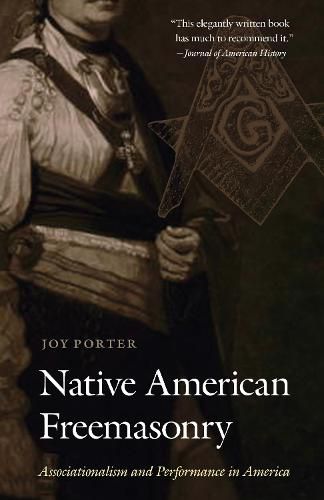Readings Newsletter
Become a Readings Member to make your shopping experience even easier.
Sign in or sign up for free!
You’re not far away from qualifying for FREE standard shipping within Australia
You’ve qualified for FREE standard shipping within Australia
The cart is loading…






Freemasonry has played a significant role in the history of Native Americans since the colonial era-a role whose extent and meaning are fully explored for the first time in this book. The overarching concern of Native American Freemasonry is with how Masonry met specific social and personal needs of Native Americans, a theme developed across three periods: the revolutionary era, the last third of the nineteenth century, and the years following the First World War. Joy Porter positions Freemasonry within its historical context, examining its social and political impact as a transatlantic phenomenon at the heart of the colonizing process. She then explores its meaning for many key Native leaders, for ethnic groups that sought to make connections through it, and for the bulk of its American membership-the white Anglo-Saxon Protestant middle class.
Through research gleaned from archives in New York, Philadelphia, Oklahoma, California, and London, Porter shows how Freemasonry’s performance of ritual provided an accessible point of entry to Native Americans and how over time, Freemasonry became a significant avenue for the exchange and co-creation of cultural forms by Indians and non-Indians.
$9.00 standard shipping within Australia
FREE standard shipping within Australia for orders over $100.00
Express & International shipping calculated at checkout
Freemasonry has played a significant role in the history of Native Americans since the colonial era-a role whose extent and meaning are fully explored for the first time in this book. The overarching concern of Native American Freemasonry is with how Masonry met specific social and personal needs of Native Americans, a theme developed across three periods: the revolutionary era, the last third of the nineteenth century, and the years following the First World War. Joy Porter positions Freemasonry within its historical context, examining its social and political impact as a transatlantic phenomenon at the heart of the colonizing process. She then explores its meaning for many key Native leaders, for ethnic groups that sought to make connections through it, and for the bulk of its American membership-the white Anglo-Saxon Protestant middle class.
Through research gleaned from archives in New York, Philadelphia, Oklahoma, California, and London, Porter shows how Freemasonry’s performance of ritual provided an accessible point of entry to Native Americans and how over time, Freemasonry became a significant avenue for the exchange and co-creation of cultural forms by Indians and non-Indians.